Welcome to our column, Russia Update, where we will be closely following day-to-day developments in Russia, including the Russian government’s foreign and domestic policies.
The previous issue is here, and see also our Russia This Week and feature Is Putin Really Reining in Hard-Liners? Fact-Checking Gordon Hahn’s Article In The Moscow Times
Chechen leader Ramzan Kadyrov has made good on his threat to destroy the homes of relatives of the terrorists who attacked Grozny December 4. Four homes were burned to the ground in Achkhoy-Martan yestersday.
Please help The Interpreter to continue providing this valuable information service by making a donation towards our costsâ€.
UPDATES BELOW
Today is International Human Rights Day, but few Russians risked cold or arrest to mark it with any kind of picket, as they have in past years.
Moscow’s Memorial Society, whose Russian branch has been
fending off a determination of “foreign agent” by the Justice Ministry,
staged a quieter action that they hope will have a lasting effect.
Activists placed metal plaques with the names of victims of
Stalin’s purges on the apartment buildings where they had lived, as part
of an ongoing effort to remember the victims of communism and prevent
the recurrence of its legacy — an uphill battle.
Arseny Roginsky, a historian and former political prisoner who heads Memorial, explained the project (Translation by The Interpreter):
“Moscow is the city that suffered the most from Soviet terror. In
1937-1938 alone, 90,000 people were arrested, and approximately 30,000
of those arrested were shot. So today go around the city, and find traces of this, there are none.There is nothing at the places where
there were prisons, there is nothing at the places where decisions were
made, much less the places where people lived. There are just a few
memorial plaques, and yet, the shamefully forgotten word ‘shot’ is never
used, they are afraid to use it. ‘Here lived Marshal Tukachevsky, here
lived director Meyerhold. And the word isn’t there, no it’s not.”
Eugene Asse, an architect and participant in the project said that
Memorial had been unable to find official city support for their effort:
“When we began there were some minimal conversations about the
feasibility of some official support of the project. There were
responses of this type, ‘What, will we turn the whole city into a columbarium?
To which we replied, ‘But that’s exactly what it is. That’s what it is.
It will be the truth of our history. ‘But we don’t need that kind of
truth. Why should we turn the city into a columbarium?'”
Protesters against cuts in the health care budget and dismissal of
doctors continued their camp-out at the office of United Russia on Banny
Lane, after four people who had been arrested returned to the site, OVDinfo.org reported.
Anastasiya Zotova, a reporter from the web site OGON (United Group for Public Monitoring), tweeted about the doctors’ vigil:
Translation: Doctors of Moscow who have been kicked out of apartments have put up a tent camp outside the office of United Russia. Right now. The police aren’t here.
Police did come but released the protesting physicians without charge, News.ru reported. In November, thousands of health care workers turned out to protest cuts in the health care budget.
A journalist at the protest, Aleksandr Zimbovsky, was detained despite showing his press card.
Zotova has covered a few other protests this week:
On December 6, anti-war picketers protested the war in Ukraine but were set upon by ultranationalist thugs who broke their flag poles.
Translation: Eduard shows his broken flag-pole.
There was another picket in defense of the prisoners of the Bolotnaya Square demonstrations which evidently proceeded without police intervention:
An African doctor was stabbed in the stomach for asking a racist Russian attacker to address him by name, Moscow Times reported.
An eye surgeon from the Democratic Republic of Congo (DRC) who gave only his first name of “Francis” had fled violence in his homeland and immigrated to Russia. But the level of Russian racism he has faced has forced him to seek refuge in a monastery.
Katya Bermant, a human rights activist published his story featured on Colta.ru on her Facebook page, and included a photo of Francis pointing to his wounds. Someone reported the photo to Facebook administrators as violating their guidelines, but the picture remains.

Photo by Aleksandr Savin/Colta.ru.
In Podolsk, Francis was approached by a local man who called him “a nigger” and demanded to take a picture with him, using the familiar Russian pronoun for “you” which is considered rude when used with strangers. When the doctor gave his name and said he was black, not a “nigger,” the man stabbed him in the stomach.
Colta.ru published a photo essay today December 10 by Aleksandr Sovin about how Africans live in Russia, including a photo of Francis in Muranovo, the provincial town where he lives:

Refugees from Africa are often moved to remote areas. Neznayka is one of the few shelters in Moscow Region that is willing to take mothers and children, although they say they have little room and need repairs:

Shula, an asylum-seeker from DRC, working at the Neznayka shelter in 2014. Photo by Aleksandr Savin.
Russian state propaganda concentrates on racism in the United States, with saturation coverage of the killing by police of black men in Ferguson, Missouri and New York City.
But there have been at least six murders of black people in Russia and 177 violent attacks against blacks since 2008, according to Russia’s Sova Center, an NGO that monitors extremist movements and hate crimes in Russia. The actual numbers are much higher as victims are reluctant to report such crimes, some for fear of deportation.
The Los Angeles Times ran a feature on November 2 headlined “African Migrants in Russia Describe ‘Hell on Earth.‘”
Remy Bazie, a migrant from the Ivory Coast, was beaten unconscious by assailants with an iron bar in a train station and spent months raising money to have necessary surgery on his jaw. John Steven Abumen, a Nigerian working as an English tutor, says he has been attacked 3 times in 15 years, suffering multiple injuries with permanent damage. No action was taken by police when he reported the assaults.
Russian ultranationalists told the Los Angeles Times that they were more focused on Central Asian and Caucasus migrants than Africans, because they are many more of them.
According to Sova Center, a total of 19 people were killed in incidents in the past year so far related to xenophobia and radical nationalism, and 97 were injured in 24 regions of Russia. Two more received serious threats against their lives.
These figures can fluctuate from year to year depending on whether there are major ethnic riots, such as in Biryulyovo last year. But the numbers have dropped in recent years.
In 2008, there were 99 murders and 437 violent assaults and in 2009, 36 murders and 125 injured, EurasiaNet reported; last year there were 21 race-related murders in 2013, according to Sova’s records. A large number of those killed are Central Asian labor migrants.
The government convicted 39 people in 16 regions of racist violence, and another 132 people for racist propaganda.
But as Sova points out, the anti-extremism statutes can be misused.
For example, Fauziya Bayramova, a Tatar writer, activist, and leader of Milli Mejlis (the alternative “national parliament”), was found guilty of “extremism” for publishing articles about the forcible annexation of the Crimea and war in Ukraine on her Facebook page. She was given a one-year suspended sentence.
The Russian economy is heavily reliant on oil and other natural resources, and the collapse of the price of oil is a major factor (but obviously not the only one) causing the ruble to free fall.
This, then, is bad news for Russia:
Bloomberg has also created a single graph showing the timeline of the ruble collapse since October, pointing out all the the attempts Russia has made to prop up the currency:

Read their full analysis here.
Today Russia is expected to raise their main lending rate to help stem the tide. Bloomberg reports:
The Bank of Russia will increase its key rate to 10.5 percent from 9.5 percent, according to the median estimate of 34 economists surveyed by Bloomberg. Nine analysts predict a bigger increase. Fifty of 77 traders polled by brokerage Tradition project a rate increase of between 100 and 400 basis points. The regulator will announce the decision at about 1:30 p.m. tomorrow in Moscow, followed by a news conference.
The ruble’s 40 percent slide this year has left policy makers with dwindling options after they shifted to a free-floating exchange rate ahead of schedule last month and spent about $80 billion on defending the currency. The central bank, led by Governor Elvira Nabiullina, has raised rates by 400 basis points since President Vladimir Putin’s incursion into Ukraine’s Crimea in March, which led the U.S. and the European Union to impose sanctions. Oil has tumbled into a bear market.
Meanwhile, Russia is trying desperately to calm nervous investors. Russian Prime Minister Dmitry Medvedev said today that the currency is currently undervalued. AFP reports:
“It’s definitely not necessary to go into hysterics,” Medvedev said in an annual televised interview.
“Here, people just need to have patience and look at how events developed in a similar situation in 2008-2009 when the ruble weakened significantly,” he told five television channels.
“Most economists and analysts agree that at the moment the ruble is excessively weakened, that is, it is undervalued,” said Medvedev, who served a four-year stint as president from 2008 before ceding the Kremlin back to his mentor Vladimir Putin in 2012.
Despite Medvedev’s assurances, the trend is clear — oil looks like it’s set to continue to drop in value, and there’s no sign that Russia has a clear strategy to stop their own currency from following suit.
— James Miller
The trial of opposition politician Alexey Navalny in the Yves Rocher case involving claims of fraud has been underway for six days, zona.media reports.
Although Yves Rocher executives have testified that they have no claims against Navalny and his brother, also brought into the case, Russian prosecutors have persisted with the prosecution.
Navalny’s lawyers petitioned to postpone the hearing to enable more witnesses to be summoned for the defense, but the judge rejected it. The lawyers also petitioned to remove from the case a supposed “independent analysis” of the Navalny’s books by the Federal Security Service (FSB), noting that by definition it couldn’t be independent. This appeal, too, was declined.
Despite the pressure of multiple court cases, Navalny has continued with his activities. Recently his petition for legislation against “unlawful enrichment” in keeping with the UN Convention Against corruption reached 100,000 signatures, which is required to get a response from the Kremlin.
Navalny also uncovered an expensive dacha owned by Nikolai Patrushev, the secretary of the National Security Council and former head of the FSB.
“As you can see from the biography of Nikolai Platonovich, there is no one further from business and earning money than he,” said Navalny, using Patrushev’s patronymic. Patrushev has spent his entire career as a civil servant.
Examining the income declarations of Patrushev and his wife, he found his wife only made 1.8 million rubles in six years, yet she was able to buy a number of properties and build a large dacha on the river in the exclusive community of Serebryany Bor. Sifting through real estate records, Navalny’s investigative team found the dacha and was even able to get an aerial view:
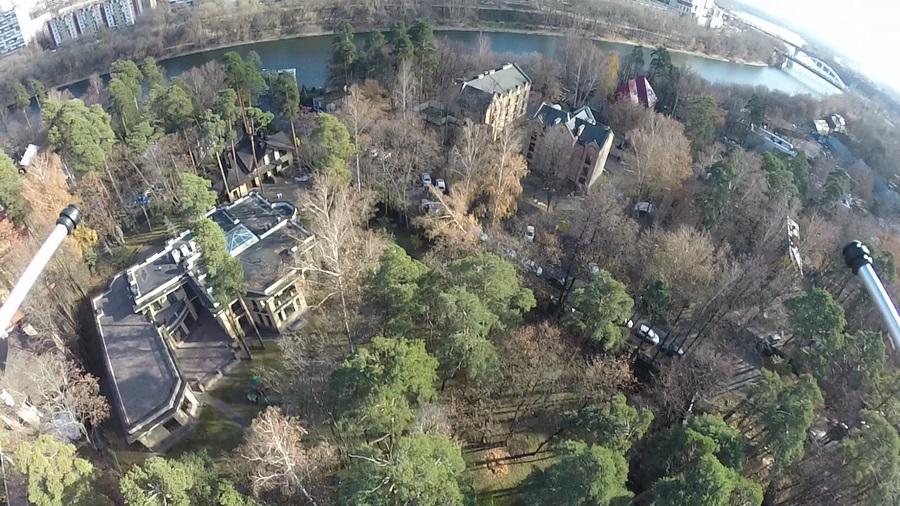
Navalny also recently published information about the foreign real estate
purchases of Mikhail Lesin, head of Gazprom-Media, which owns Ekho
Moskvy. Lesin has been pressuring the station to conform to stricter
guidelines to avoid conflict with the Kremlin.
Among Lesin’s four homes abroad is a $28 million mansion in Los Angeles:
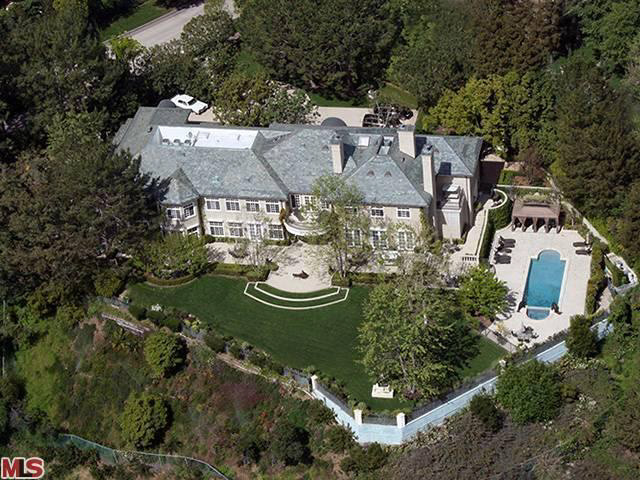
Navalny
also published a letter from US Assistant Attorney General Peter Kadzik to
Sen. Roger Wicker (R-MS), noting that he had referred the investigation
of Lesin for possible violation of the Foreign Corrupt Practices Act to
the FBI.
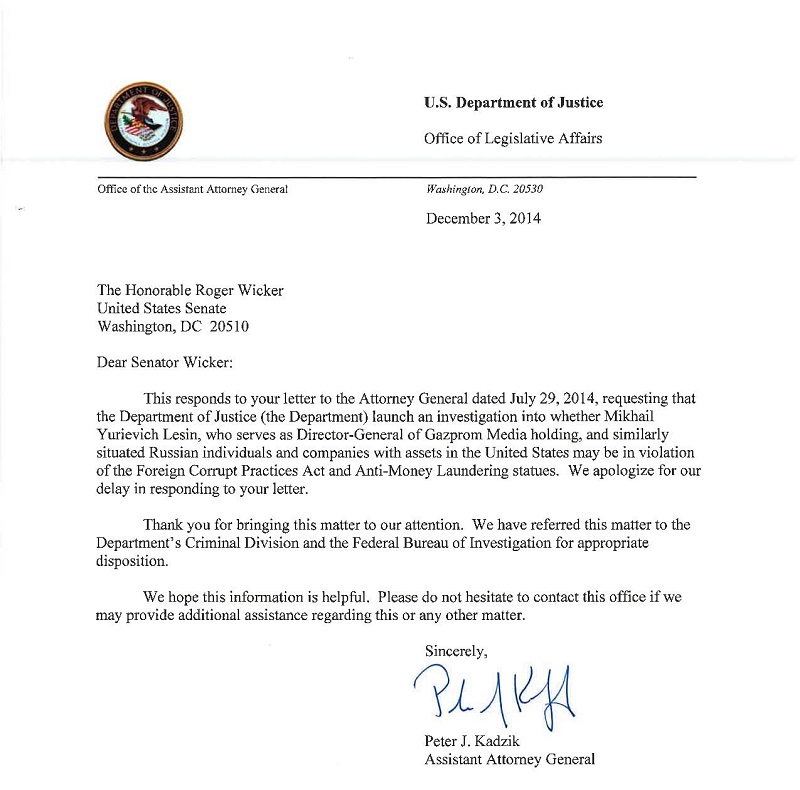
— Catherine A. Fitzpatrick
The Russian state-owned TASS news agency has been reporting today on President Putin’s official visit to Uzbekistan today, during which the Russian leader and the authoritarian dictator of Uzbekistan, Islam Karimov, announced a number of new measures of economic cooperation between the two states.
Most notably, Yury Ushakov, an aide to Vladimir Putin, announced that the two leaders are to sign an agreement on settling the former Soviet state’s $890 million debt to Russia.
The document envisages “a discount in the sum of Uzbekistan’s debt, clearing the debt in a single payment, and then all the issues can be finally considered as settled,” Ushakov said.
Uzbekistan’s debt comprises the primary amount of $500 million and the rest of the sum is the interest accrued.
The decision will allow Russia and Uzbekistan to boost bilateral cooperation, including “opening new loans in particular in the sphere of arms trade,” Ushakov said.
Furthermore, Putin announced that the two states would embark on a course towards integration in trade and economic spheres.
Putin said that Russia will commence talks with his host country on the creation of a free trade zone between Uzbekistan and the Eurasian Economic Union, due to come into existence on January 1 and comprised of Russia, Belarus, Kazakhstan and Armenia.
“We have agreed today to begin consultations concerning a possible signing of a deal between Uzbekistan and the Eurasian Economic Union (EEU) on a free trade zone,” Putin told journalists after his meeting with Uzbek President Islam Karimov.
“I would like to underline that these will be only consultations,” Putin added.
“In connection with the US and European Union’s sanctions,” said Ushakov, the two leaders were also due to discuss “the issue of expanding the supplies of agricultural produce from Uzbekistan.”
Ushakov also said that the settlement of Uzbekistan’s debt would enable “opening new loans in particular in the sphere of arms trade.”
President Putin said in Tashkent that Russia shared “the Uzbek president’s concerns over current events in Afghanistan.”
TASS reports that Karimov had:
raised at talks the situation in Afghanistan noting that he was alarmed that after withdrawal of international military contingent from that country “the situation which is taking place in Iraq will recur.” “Already today there are serious signs of some elements infiltrating in Afghanistan from Iraq and Syria. All this needs development and joint and preemptive measures,” Karimov said.
The heralding of expanded cooperation with the repressive state came as Russian Railways announced that, as of Sunday December 14, passenger train services to other central Asian states were to be cancelled “due to low profitability.”
Train services to Azerbaijan, Kazakhstan and Tajikstan (and also Ukraine) were to be cancelled but those to Belarus, Moldova, Abkhazia and Uzbekistan were to remain in operation.
— Pierre Vaux
President Ramzan Kadyrov of the Chechen Republic took to Instagram to vow revenge last Friday December 5 against the relatives of the terrorists who attacked Grozny on December 4, saying their homes would be destroyed and they would be expelled from the republic (translation by The Interpreter):
If a fighter in Chechnya commits murder of a police officer or other
person, the family of the fighter will immediately be expelled beyond
the borders of Chechnya without the right of return and his house razed along with the foundation.
Sergei Babinets reports on his Facebook page that Kadyrov has already made good on his threat, as four homes of relatives were already burnt to the ground yesterday, December 9.
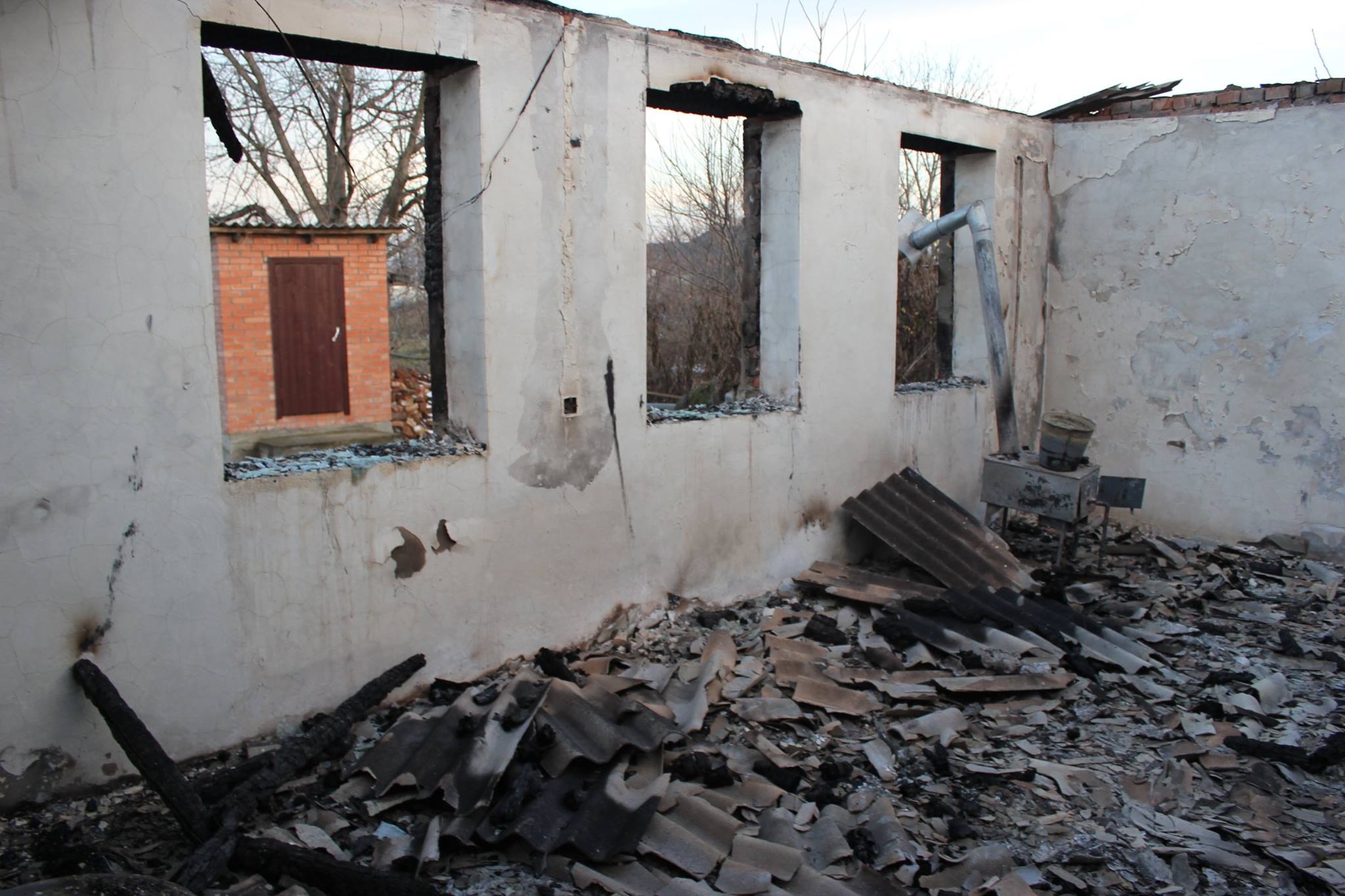
At a meeting with Chechen ministers, Kadyrov also said that village elders would be made responsible for anyone in their towns who committed terrorist acts, and would be dismissed from their posts:
If even one person from the district unlawfully takes up arms and ends up among the bandits, these people will immediately be dismissed. Let them work day and night so this doesn’t happen. We will not let them become Wahhabis, or even imitate them in dress or manner.

In the village of Yandi in Achkhoy-Martanov District, men in masks set fire to four homes of relatives of the terrorists who attacked the Press House December 4, none of whom survived the gunfight with police. Aleksandra Sokolova covered the arson for slon.ru and took photos.

The owners were held back from their property while everything was
set on fire. They were not allowed to remove their personal items and
documents.
Igor Kalyapin of the Russian non-governmental group Committee
Against Torture asked the Investigative Committee and the Prosecutor
General to investigate whether Kadyrov’s orders were a crime,og.ru reported.
Kadyrov has been filling up his account on Instagram, his preferred
platform for public statements, with fiery threats in the last week as he also grieves for Umar Kadyrov, a 22-year-old relative evidently working in law-enforcement who was killed during the police fire-fight at the Press House.
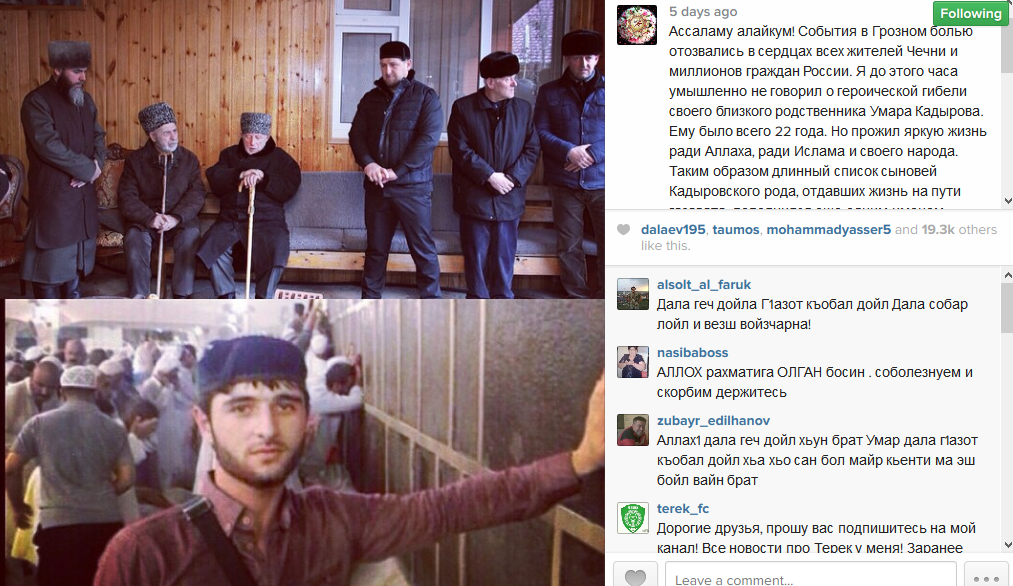
The Chechen leader attended a religious service, and quoted Sheikh Salakh’s:

(Translation by The Interpreter)
Mufti Salakh Mezhiev in his homily called those who try to
lead Muslims astray from the path of righteousness enemies of Islam.
These dogs of hell murdered righteous caliphs, grandsons of the Prophet,
associates, sheikhs, elders.Sheikh Salakh says assuredly that those bandits who shed the
blood of Muslims in Chechnya and who commit mass murders in the
countries of the Near East, without a doubt are Wahhabis, descendents of
the Kharijites.
Kadyrov, who has been placed on the Magnitsky List of sanctions for mass human rights violations, says he doesn’t care about such things:
I absolutely do not care about the opinion of any persons or
so-called human rights organizations, who have been silently watching
the murder of millions of Muslims in Syria and Iraq by NATO airplanes
and fighters trained by the West.
— Catherine A. Fitzpatrick